A biblical prophecy mentions a 200 million man army; discover its mysterious origins and what it could mean for our future.
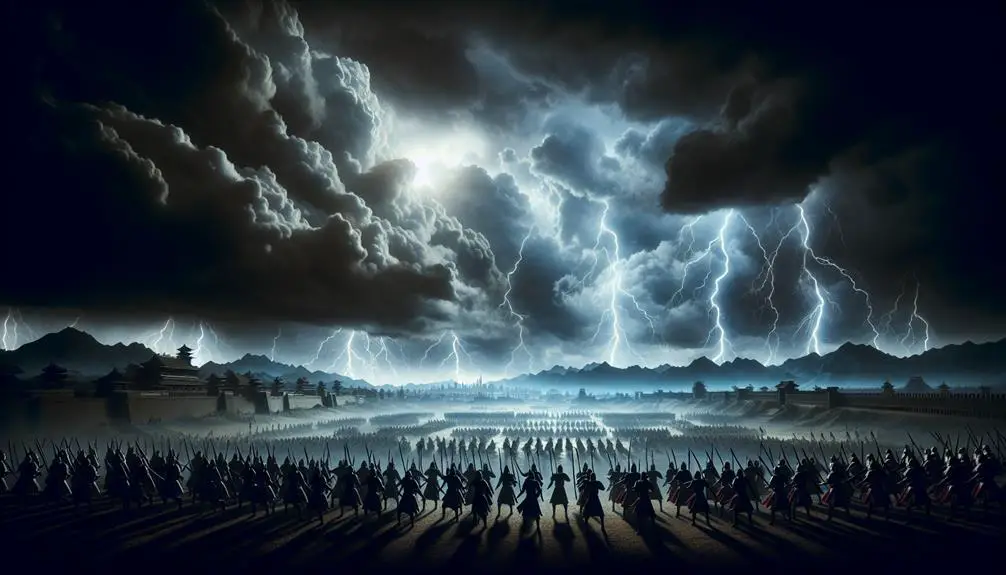
200 Million Man Army in the Bible
While it might seem far-fetched to imagine a 200 million man army, the Bible's references to such a force in the Book of Revelation have intrigued scholars and theologians alike. You're likely aware that interpreting biblical prophecies can be complex, yet the idea of such a vast army raises fascinating questions about historical context, symbolic meanings, and future implications.
As you consider the layers of interpretation and the debates among modern scholars, you'll find that this topic not only sheds light on ancient texts but also offers insights into how global events could unfold. This discussion promises to challenge your understanding and possibly change your perspective on biblical prophecies.
Key Takeaways
- The '200 million man army' in Revelation symbolizes divine judgment and overwhelming force.
- Interpretations vary, with scholars debating its metaphorical versus literal significance.
- Archaeological and historical insights help contextualize the feasibility of such a large force.
- The prophecy's implications extend to global geopolitics, economics, and environmental concerns.
Historical Context
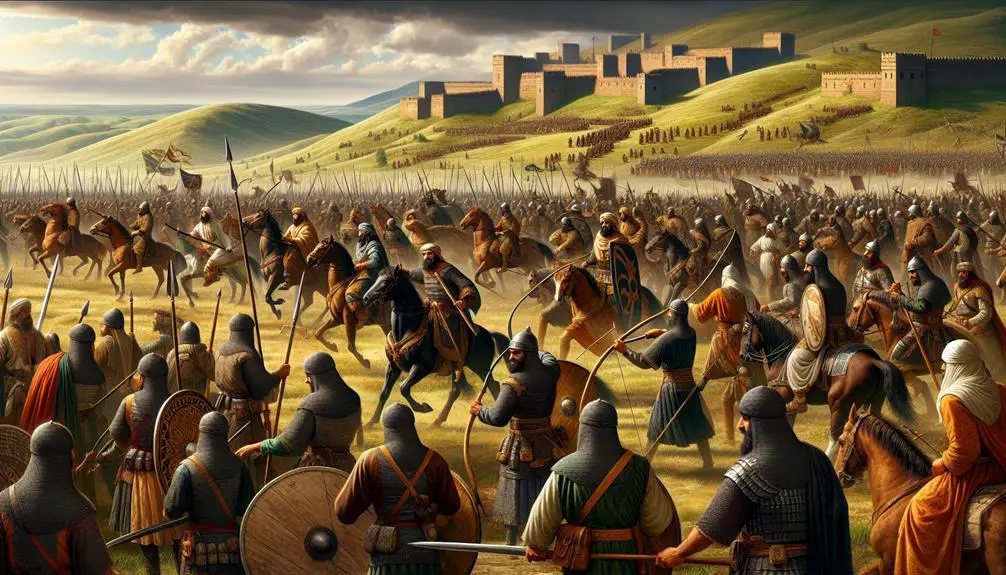
Delving into the historical context, it's crucial to understand that the concept of a '200 million man army' mentioned in the Bible emerges from specific prophetic passages, reflecting the cultural, military, and theological landscapes of ancient times. You're stepping into a realm where the lines between myth and history often blur, guided by archaeological evidence and geographical challenges that shed light on the feasibility of such a massive force.
Archaeological evidence plays a pivotal role in understanding the historical context of this biblical notion. It provides tangible links to the past, offering clues about the military capabilities and organizational structures of ancient civilizations. You'll find that the archaeological record, while rich, often presents more questions than answers. It's a puzzle that requires careful piecing together, considering the technological and logistical limitations of ancient societies.
The geographical challenges of assembling and sustaining a 200 million man army are, by any historical standard, staggering. You must consider the immense requirements for provisioning such a force, including food, water, and shelter, across vast and varied terrains. Ancient logistical networks were sophisticated for their time but limited by the technology and knowledge of the era. The idea of moving, supplying, and coordinating such a vast army would have posed insurmountable challenges, making the concept more symbolic than literal in nature.
In this analytical journey, you're exploring the intersection of faith, history, and archaeology. The discussion isn't just about numbers or military might; it's about understanding the symbolic language of ancient texts within their historical and cultural contexts. This approach allows for a deeper appreciation of the biblical narrative, recognizing its roots in the human experience of the divine.
Biblical References

Having explored the historical and logistical challenges of a purported 200 million man army, let's now examine the biblical passages that introduce this formidable concept. The primary reference to this vast military force is found in the Book of Revelation, specifically Revelation 9:16. This scripture speaks of a time of great tribulation, where an army 'twice ten thousand times ten thousand' is unleashed. This phrase, interpreted by many scholars, points to the staggering figure of 200 million.
You'll find that the context of Revelation is deeply symbolic, filled with visions that demand interpretation rather than literal understanding. However, the mention of such a specific number invites questions about its origin and meaning. The concept of divine intervention is crucial here; the text implies that this army's assembly and mobilization are orchestrated by forces beyond human control or understanding, possibly as a judgment or a cleansing act.
Moreover, the geographic accuracy of these biblical narratives often seems less concerned with literal locations and more with the symbolic significance of the regions mentioned. For example, the Euphrates River is named as a strategic point related to the army's emergence. In ancient times, the Euphrates was a significant boundary, symbolizing a division between known and unknown worlds, which might suggest a boundary crossing by this divine army from the supernatural into the natural realm.
Analyzing these references, it's clear that the biblical text invites readers to consider the power of divine will and the symbolism behind numbers and locations, rather than presenting a historical account to be taken at face value.
Symbolic Interpretations
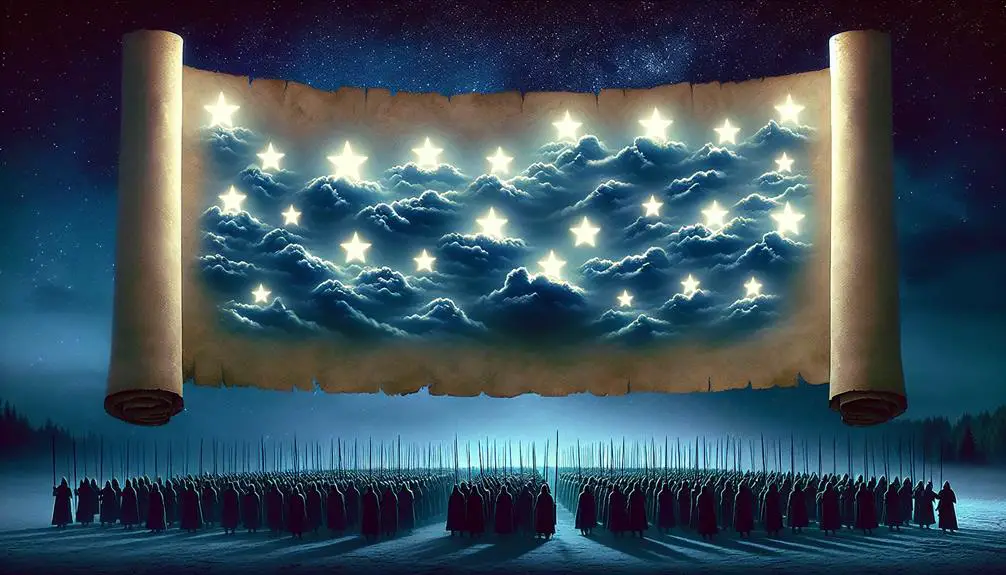
Exploring the symbolic interpretations of the 200 million man army in Revelation requires us to consider the broader thematic elements of prophecy and divine judgment within the text. Numerical symbolism plays a pivotal role throughout the Bible, and the figure of 200 million is no exception. It's not merely about the literal count but about what such a vast number represents within the prophetic framework.
In the realm of prophetic metaphors, numbers often signify concepts or truths larger than themselves. The staggering number cited in Revelation, therefore, can be seen as symbolizing an overwhelming force of divine judgment, one that's beyond human comprehension or opposition. This interpretation aligns with the apocalyptic literature's use of hyperbolic figures to convey the magnitude of God's actions in the world.
Moreover, the context in which this army appears—amid visions of calamity and divine wrath—suggests that the number might symbolize the completeness or totality of God's judgment. Just as numbers like seven or twelve often denote completeness or perfection in a biblical sense, the 200 million man army could symbolize an all-encompassing divine intervention, a judgment that's both total and irrevocable.
Analyzing these symbolic interpretations encourages you to delve deeper into the text's layers, beyond a superficial reading. It's about engaging with the rich tapestry of prophetic metaphors and numerical symbolism that the Bible employs, offering insights into the profound ways in which divine action and human history are intertwined within the biblical narrative.
Modern Scholarly Views

Shifting focus to modern scholarly views reveals a wide spectrum of interpretations regarding the 200 million man army, reflecting evolving perspectives on biblical prophecy and its implications for contemporary understanding. You're entering a realm where textual criticism and archaeological evidence play pivotal roles, illuminating the path towards a nuanced comprehension of ancient texts.
- Textual Criticism and Its Impact: Scholars delve into the original language and manuscripts of biblical texts, seeking discrepancies or variations that might shed light on the intended meaning of the 200 million man army.
- Archaeological Evidence's Contribution: Recent discoveries provide context that challenges or supports traditional interpretations, offering tangible links to the world from which these prophecies emerged.
- Historical Contextualization: Understanding the historical backdrop of the biblical era offers insights into whether the mention of a 200 million man army was symbolic, exaggerated, or feasible.
- Interpretative Frameworks: The shift towards viewing this prophecy through various lenses, such as metaphorical, apocalyptic, or literal, demonstrates the diverse ways modern scholars approach biblical texts.
As you navigate these scholarly avenues, it's clear that modern interpretations aren't monolithic. They're informed by advancements in historical knowledge, archaeological findings, and methodological approaches in textual criticism. These factors collectively influence how scholars today unravel the complexities of biblical prophecies. The challenge lies in balancing respect for ancient texts with rigorous scholarly inquiry, ensuring that interpretations remain grounded in evidence while open to evolving understandings of history and culture.
Global Impact Theories
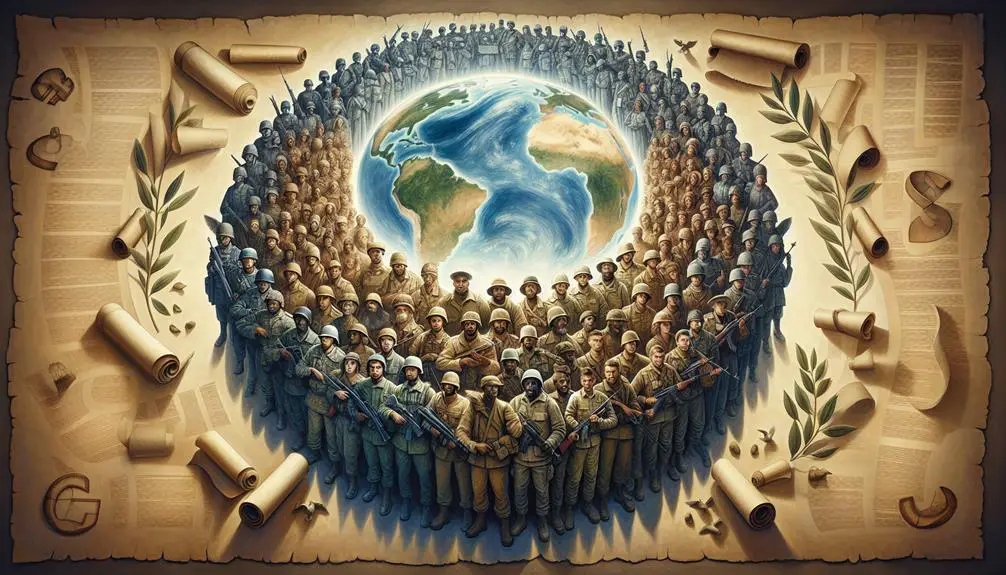
Theories regarding the global impact of the 200 million man army prophecy span a broad spectrum, critically challenging traditional interpretations and prompting a reevaluation of its significance in a contemporary context. As you delve deeper, you'll find that scholars and theorists alike dissect the prophecy's potential outcomes, focusing particularly on economic repercussions and sociopolitical dynamics.
Aspect |
Potential Impact |
|---|---|
Economic repercussions |
Strain on global resources; market destabilization |
Sociopolitical dynamics |
Shift in power balances; increased geopolitical tensions |
Military strategy |
Escalation of arms races; innovation in warfare tactics |
Diplomatic relations |
Alliances formed based on mutual interests or threats |
Environmental implications |
Overuse of resources; increased pollution |
Analyzing the economic repercussions, you're looking at a scenario where the mobilization of such a vast force could severely strain global resources, leading to market destabilizations that ripple across economies. This isn't just about the direct costs of maintaining an army but also the indirect effects on trade, investment, and international relations.
Diving into the sociopolitical dynamics, the prophecy's realization could drastically shift power balances, fostering increased geopolitical tensions. Nations might realign, forming new alliances or breaking old ones based on perceived threats or mutual interests. This scenario doesn't just alter the diplomatic landscape; it could fundamentally change how nations interact on the global stage.
In essence, the prophecy's global impact theories suggest a world on the brink of profound change, where economic and sociopolitical dynamics are inextricably linked, each influencing the other in complex and often unpredictable ways.
Cultural Influences
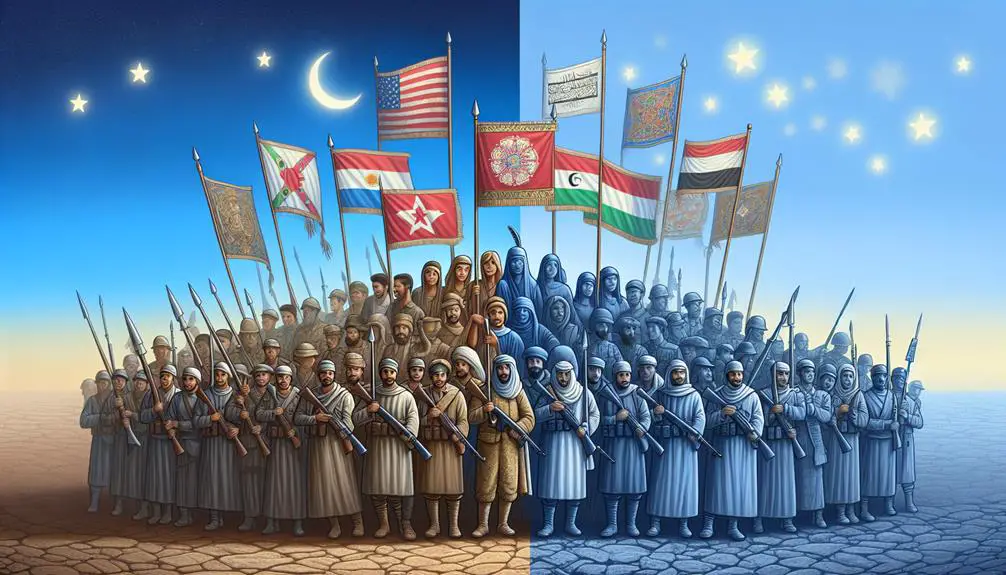
You must consider how the ancient origins of this prophecy have woven through the fabric of various cultures, influencing interpretations and perceptions over centuries.
The transition of this prophecy from an ancient context to its modern implications showcases a dynamic interplay between historical beliefs and contemporary societal values.
Analyzing this evolution reveals the profound impact of cultural lenses on understanding biblical prophecies.
Ancient Prophecy Origins
Exploring the origins of ancient prophecies reveals how cultural influences have shaped their development and interpretation. The quest for prophecy accuracy and understanding divine inspiration has been deeply influenced by the societal, historical, and spiritual contexts of the times. These prophecies weren't created in isolation but were a reflection of the collective consciousness and cultural dynamics.
- Historical Events: Shaped the specificity and urgency of prophecies.
- Cultural Beliefs: Influenced the interpretation and acceptance of divine inspiration.
- Linguistic Nuances: Played a crucial role in the conveyance of prophecy accuracy.
- Spiritual Practices: Determined the methodology and rituals associated with prophecy.
Analyzing these elements offers a deeper insight into how ancient prophecies were formulated, understood, and valued within their original cultural contexts.
Modern Interpretations Impact
As we consider how ancient prophecies have evolved, it's crucial to examine the cultural influences shaping their modern interpretations. Today's readings of the Million Man Army prophecy aren't isolated from the world around them. They're deeply entangled with political implications that inform and sometimes skew their understanding.
In this digital age, digital evangelism plays a pivotal role in disseminating interpretations far and wide, crossing cultural and geopolitical boundaries with unprecedented speed. This digital spread transforms the prophecy into a versatile narrative, adaptable by various groups to support their ideological stances.
The intersection of technology, politics, and religion thus crafts a complex tapestry, where ancient texts meet modern agendas, reshaping perceptions in a continuous dialogue between the past and the present.
Future Implications
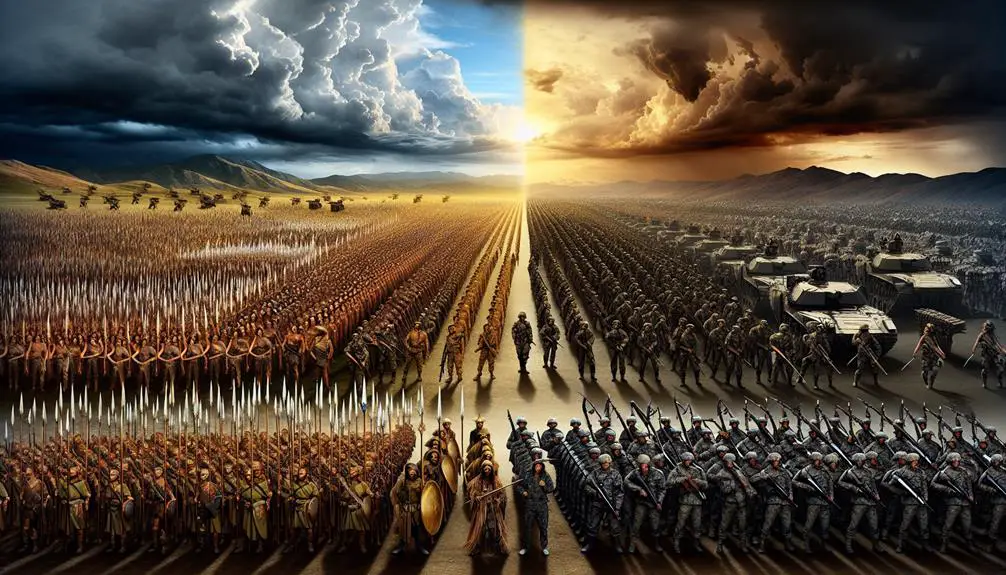
Considering the prophetic significance, the concept of a 200 million man army mentioned in the Bible has profound implications for future global dynamics and theological interpretations. As you delve into the depths of this prophecy, it's crucial to understand how it intersects with contemporary concerns and eschatological expectations. The interpretation of this colossal army not only resonates with end time scenarios but also raises significant moral implications for believers and scholars alike.
To grasp the complexity and the multifaceted nature of this prophecy, consider the following points:
- The sheer scale of a 200 million man army emphasizes the potential for unprecedented global conflict, highlighting concerns over the escalation of warfare technology and international tensions.
- The symbolic interpretation of this army may reflect on the moral and spiritual battles humanity faces, urging a deeper introspection into our collective ethical compass.
- This prophecy's alignment with end time scenarios fosters a broader understanding of biblical eschatology, encouraging scholars to explore connections between ancient texts and contemporary global events.
- The moral implications inherent in this prophecy challenge individuals to consider their role in a world that could be on the brink of significant spiritual and physical upheaval.
As you ponder over these points, it's essential to navigate the intersection between ancient prophecy and modern-day realities with a critical and interpretive lens. The discussion surrounding the 200 million man army not only sheds light on potential future events but also invites a profound exploration of our current moral and spiritual standings in a rapidly changing world.
Frequently Asked Questions
How Have Various Religious Denominations Specifically Integrated the Concept of the Million Man Army Into Their Doctrines or Liturgical Practices?
You'll find that various religious denominations have woven the concept of a vast army into their beliefs and worship in unique ways.
These liturgical adaptations often stir doctrinal controversies, pushing communities to revisit and sometimes redefine their interpretations.
Analyzing these changes, it's evident that the symbolic representation of strength and unity resonates deeply, yet differently, across faiths, leading to an array of practices and theological debates centered around this imagery.
Can You Provide Examples of Contemporary Music, Art, or Literature Inspired Directly by the Idea of the Million Man Army in the Bible?
You're exploring how contemporary creators draw from historical or mythological armies to inspire their work.
Musical motifs often capture the grandeur and scale, while artistic representations delve into the drama and might of such forces. For instance, composers might weave intricate harmonies to evoke the vastness of an army, and artists could use bold strokes to portray its strength.
Literature, too, reimagines these epic assemblies, embedding them in narratives that reflect on power and unity.
Are There Any Recorded Instances Where Individuals or Groups Claimed to Have Received Divine Revelations or Visions Related to the Million Man Army, Outside of the Biblical Context?
You're delving into whether individuals or groups outside biblical narratives have claimed divine revelations related to a vast army. While specific to a 'million man army' mightn't be widespread, various movements and leaders have asserted divine legitimacy, often framing their visions within a context of spiritual warfare.
These claims, however, pose challenges to visionary authenticity, inviting scholarly scrutiny on the motives, interpretations, and impacts of such divine assertions on followers and broader communities.
How Has the Concept of the Million Man Army Been Utilized or Referenced in Political Speeches or Movements Throughout History, Particularly in Non-Western Societies?
When examining how the concept of the million man army has been used in political speeches or movements, especially in non-western societies, you'll find it's often wielded as a tool of military strategy and cultural symbolism.
Leaders use the imagery to inspire unity and demonstrate strength, tapping into the collective psyche. This strategic invocation goes beyond mere numbers; it's a symbolic call to action, reflecting deep-rooted historical and cultural narratives.
What Role Has the Million Man Army Played in Popular Media, Such as Films, Television Shows, or Video Games, Especially Those Not Explicitly Focused on Religious Themes?
In popular media, the concept of a million man army has significantly influenced game mechanics and cinematic portrayals, offering a rich canvas for storytelling and gameplay.
You'll notice this theme is often used to amplify the scale of conflict, creating epic narratives or challenging game scenarios.
It's not just about the numbers; it's about the implications of such a force, shaping how stories unfold or how strategies are crafted in games, transcending mere religious origins.
Conclusion
In examining the concept of a 200-million-man army, you're venturing into the heart of biblical symbolism and its profound ripple across cultures and epochs.
Like a seed planted in ancient texts, this idea has germinated across centuries, influencing theological, scholarly, and societal landscapes. Its growth, branching into various interpretations and debates, underscores humanity's quest for understanding amidst the mystical.
This narrative, much like the mustard seed described in the Gospels, started small but has grown into an immense tree, sheltering diverse scholarly and cultural discussions under its canopy.



Sign up